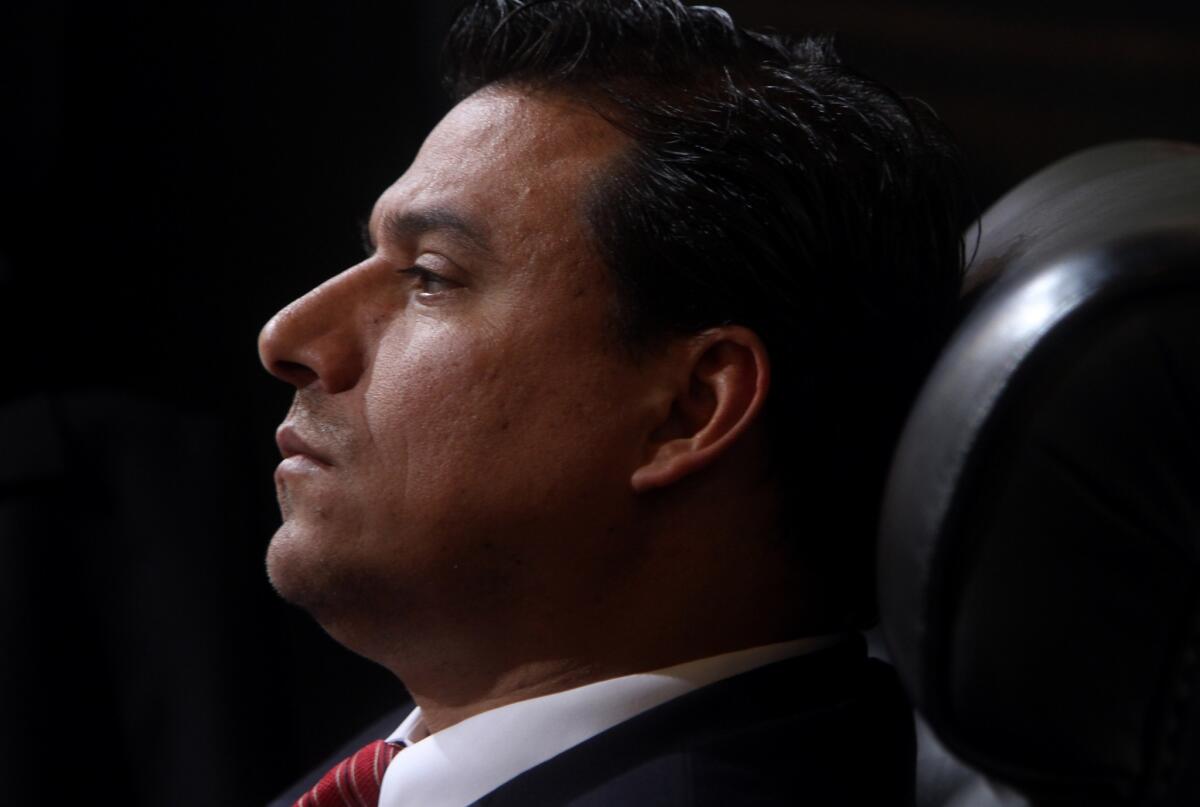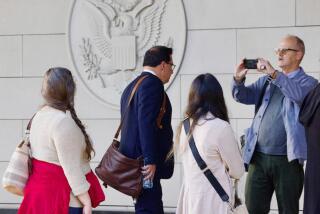Column: A city councilman is charged with racketeering, and we just yawn. That’s how bad things are

- Share via
How have we gotten to a point in Los Angeles where the arrest of a City Councilman is not just unsurprising, but anti-climactic?
Councilman Jose Huizar, once a political rising star, crashed and burned Tuesday morning when he was arrested on a charge of federal racketeering, accused of running “a criminal enterprise that used his powerful position at City Hall to solicit and accept lucrative bribes and other financial benefits to enrich himself and his close associates.”
Ho-hum and what else is new, right?
If you’re keeping score at home, this makes two fallen heroes in just three months at City Hall. Councilman Mitch Englander has already agreed to plead guilty to corruption charges after being plied with cash and other favors that included a trip to Vegas, where he filled his pockets and ruined his name.
Can you imagine an easier job than being a federal investigator assigned to L.A. City Hall, where a pay-to-play culture has been entrenched for years? I mean, you don’t even have to bait the hook to reel in the lunkers, left and right. As the U.S. attorney in Los Angeles, Nick Hanna, said Tuesday of the building housing our city’s government: “Unfortunately, its grand exterior has concealed a cancer.”
The most amazing thing about all this is that the alleged perps could have done pretty well for themselves without breaking the law. The rules of doing business at City Hall and making donations to candidates are so notoriously toothless in Los Angeles, there’s little need to go rogue.
Currying favor is legal. Donating either directly to a candidate or to a fund or cause the candidate is associated with is simple. Reforms proposed recently by Councilman David Ryu were pecked at by City Hall piranhas until they were practically useless.
I once saw Huizar at Philippe’s and he said hello. I mentioned to him that I had just gotten an invitation to a campaign fundraiser for him sponsored by a developer attorney who had business before the Council. He didn’t seem to find anything remarkable in all that coziness.
That’s the history at City Hall, and when my former colleague Bill Boyarsky was on the city Ethics Commission in the early 2000s, he was so frustrated by resistance to reform, he became cynical about the possibility of things ever changing.
“The problem at City Hall is that the whole attitude is that it’s a club, with primarily developers being the greatest power,” said Boyarsky, who was an editor and columnist at The Times before serving on the ethics panel. “They have the most money at stake because they’re building stuff, and so it’s a combination of the developers and the building trades, and they’re very skilled lobbyists.”
Boyarsky said he was appointed to the commission by then-City Controller Laura Chick, who asked him to raise a ruckus. That just wasn’t possible, he said, because any serious attempts at serious reform were rebuffed by those whose mission was to protect the entrenched culture.
Reform proposals that made it out of the panel were sent to the City Hall rules committee, which was headed at times by then-councilman and current Mayor Eric Garcetti. Boyarsky called that committee the “graveyard” of all good reform ideas.
Boyarsky said he remains cynical about the chance of real reform. When I asked what he thought might work best, he said “arrest people.” OK, so now the feds are trying that.
There’s another thing or two that might work, too. The system of land-use decision-making is an invitation to corruption. What can be built here or there is often a subjective decision. Variances and exceptions are constantly being sought by developers, who know that if they can persuade a single councilman to back a project, other council members are likely to roll over.
It’s a culture of you scratch my back, I’ll scratch yours. And in the cases of both Englander and Huizar, prosecutors allege, developers won over the councilmen with what was essentially sacks of money.
And speaking of the culture, Garcetti and Council President Nury Martinez were as quiet as mice while the rats played. Nobody stands up to anyone else at City Hall, even when rebukes are most needed. The code of silence is rarely broken, and at the very least, city leaders worth their salaries should have been leading the call for campaign finance and land-use reforms to avoid the embarrassing debacles we’re seeing now.
It’s been known for months that Huizar was going down. His office and home were raided by authorities in 2018. A former aide, a political fundraiser and a real estate consultant all felt the heat and struck plea deals with the government.
Huizar is accused of a blatant scheme that was the equivalent of thumbing his nose at taxpayers. The allegations have him shaking down real estate developers for cash bribes and campaign donations in exchange for his help in pushing high-rise projects through. The lubrication allegedly included free plane travel and high-end meals as well as poker chips.
But he doesn’t seem to have played his hand so well.
And for once, taxpayers are holding a royal flush.
More to Read
Sign up for Essential California
The most important California stories and recommendations in your inbox every morning.
You may occasionally receive promotional content from the Los Angeles Times.











